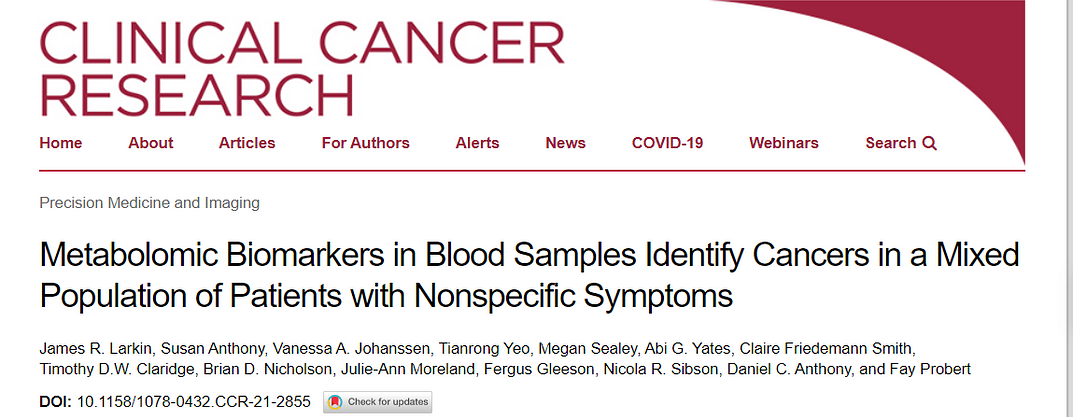The test is a technological first in determining the metastatic status of a cancer without using prior insight of the primary cancer presented.
PharmaTimes Online
5th January 2022
Cancer researchers at the University of Oxford have developed a new type of blood test, which can be used to detect a range of cancers.
The test can also detect whether these cancers have metastasised in the body and is the first of its kind, using nuclear magnetic resonance (NMR) metabolomics. These identify the presence of biomarkers in the blood called metabolites — small chemicals that our body both naturally produces — which are produced by cancer cells.
The study, published in Clinical Cancer Research, a journal of the American Association of Cancer Research, analysed samples from 300 patients with non-specific but concerning symptoms of cancer.
Non-specific symptoms included fatigue and weight loss and patients were recruited through the Oxfordshire Suspected Cancer (SCAN) pathway. Cancer was correctly detected in 19 out of every 20 patients with cancer and among those with cancer, metastatic disease was identified with an overall accuracy of 94%.
This is the first technology able to determine the metastatic status of a cancer from a blood test, without prior knowledge of the primary cancer type. It is hoped the test will help clinicians detect cancer and assess cancer stage.
“This work describes a new way of identifying cancer. The goal is to produce a test for cancer that any GP can request,”said Dr Fay Probert, lead researcher of the study from the University of Oxford.
“We envisage that metabolomic analysis of the blood will allow accurate, timely and cost-effective triaging of patients with suspected cancer and could allow better prioritisation of patients based on the additional early information this test provides on their disease.”
Cancers are more likely to be successfully treated when detected earlier. It is hoped — particularly in application to patients with non-specific symptoms — that the rapid and inexpensive test offered by Oxford researchers will help overcome many of the existing barriers to the early detection of cancer.
Originally published at https://www.pharmatimes.com on January 5, 2022.

ORIGINAL PUBLICATION
Metabolomic Biomarkers in Blood Samples Identify Cancers in a Mixed Population of Patients with Nonspecific Symptoms
Clinical Cancer Research
James R. Larkin, Susan Anthony, Vanessa A. Johanssen, Tianrong Yeo, Megan Sealey, Abi G. Yates, Claire Friedemann Smith, Timothy D.W. Claridge, Brian D. Nicholson, Julie-Ann Moreland, Fergus Gleeson, Nicola R. Sibson, Daniel C. Anthony and Fay Probert
Published OnlineFirst January 4, 2022
Abstract
Purpose: Early diagnosis of cancer is critical for improving patient outcomes, but cancers may be hard to diagnose if patients present with nonspecific signs and symptoms. We have previously shown that nuclear magnetic resonance (NMR) metabolomics analysis can detect cancer in animal models and distinguish between differing metastatic disease burdens. Here, we hypothesized that biomarkers within the blood metabolome could identify cancers within a mixed population of patients referred from primary care with nonspecific symptoms, the so-called “low-risk, but not no-risk” patient group, as well as distinguishing between those with and without metastatic disease.
Experimental Design: Patients (n = 304 comprising modeling, n = 192, and test, n = 92) were recruited from 2017 to 2018 from the Oxfordshire Suspected CANcer (SCAN) pathway, a multidisciplinary diagnostic center (MDC) referral pathway for patients with nonspecific signs and symptoms. Blood was collected and analyzed by NMR metabolomics. Orthogonal partial least squares discriminatory analysis (OPLS-DA) models separated patients, based upon diagnoses received from the MDC assessment, within 62 days of initial appointment.
Results: Area under the ROC curve for identifying patients with solid tumors in the independent test set was 0.83 [95% confidence interval (CI): 0.72–0.95]. Maximum sensitivity and specificity were 94% (95% CI: 73–99) and 82% (95% CI: 75–87), respectively. We could also identify patients with metastatic disease in the cohort of patients with cancer with sensitivity and specificity of 94% (95% CI: 72–99) and 88% (95% CI: 53–98), respectively.
Conclusions: For a mixed group of patients referred from primary care with nonspecific signs and symptoms, NMR-based metabolomics can assist their diagnosis, and may differentiate both those with malignancies and those with and without metastatic disease.












